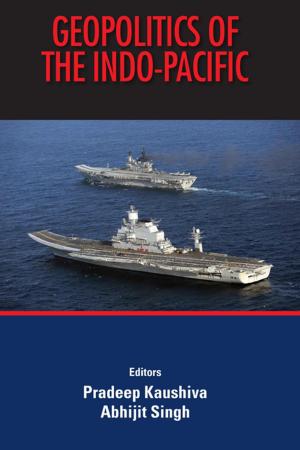Indian and American Perspectives on Technological Developments in the Maritime Domain and Their Strategic Implications in the Indian Ocean Region
| Author: | ISBN: | 9789385714788 | |
| Publisher: | KW Publishers | Publication: | April 15, 2013 |
| Imprint: | KW Publishers | Language: | English |
| Author: | |
| ISBN: | 9789385714788 |
| Publisher: | KW Publishers |
| Publication: | April 15, 2013 |
| Imprint: | KW Publishers |
| Language: | English |
The maritime domain, hosting the highways of global prosperity—through trade, industrial raw material and energy links—rates high in its potential for conflict. As the global pendulum of economic vibrancy swings eastwards, the Indian Ocean Region (IOR) has been receiving increasing attention from all actors, state as well as non-state ones, and now presents itself in sharp focus as one of the volatile seascapes on this earth. The navies operating in the region will, therefore, need to depend on high technology and associated doctrines and procedures, so as to effectively deal with the wide spectrum of challenges therein. It will also become incumbent upon such littoral states as can afford the high cost of technology, to catch up so as to maintain their relevance in the great game being played out in their very own backyard. The United States as a leader in inventing and exploiting technology sets its own benchmarks in internalization of advanced technologies to undertake maritime missions at and from the sea in support of its military operations ashore. China, on the other hand, has been striving towards achieving asymmetric war-fighting capabilities, supported by other developing technologies as well as core capabilities like the Beidou position-fixing system, which would be central to network-centric operations, including missile guidance systems. As the IOR increasingly transforms into an arena of extra-regional power play, the implications of technologically enabled confrontations and their impact on resident states are poised to weigh in on a scale never imagined before. There is thus, a greater need for India to gain in-depth knowledge of and develop a perspective on advanced technology sensors, weapons, supporting infrastructures, doctrines and futuristic concepts in the maritime domain and their potential as strategic game changers in the IOR. This book aims to foster greater understanding of the challenges facing the IOR and also look at how the technological advances in the maritime domain may possibly handle such challenges. It should provide useful resource material to those investigating the impact of technology on meeting the maritime challenges in the IOR.
The maritime domain, hosting the highways of global prosperity—through trade, industrial raw material and energy links—rates high in its potential for conflict. As the global pendulum of economic vibrancy swings eastwards, the Indian Ocean Region (IOR) has been receiving increasing attention from all actors, state as well as non-state ones, and now presents itself in sharp focus as one of the volatile seascapes on this earth. The navies operating in the region will, therefore, need to depend on high technology and associated doctrines and procedures, so as to effectively deal with the wide spectrum of challenges therein. It will also become incumbent upon such littoral states as can afford the high cost of technology, to catch up so as to maintain their relevance in the great game being played out in their very own backyard. The United States as a leader in inventing and exploiting technology sets its own benchmarks in internalization of advanced technologies to undertake maritime missions at and from the sea in support of its military operations ashore. China, on the other hand, has been striving towards achieving asymmetric war-fighting capabilities, supported by other developing technologies as well as core capabilities like the Beidou position-fixing system, which would be central to network-centric operations, including missile guidance systems. As the IOR increasingly transforms into an arena of extra-regional power play, the implications of technologically enabled confrontations and their impact on resident states are poised to weigh in on a scale never imagined before. There is thus, a greater need for India to gain in-depth knowledge of and develop a perspective on advanced technology sensors, weapons, supporting infrastructures, doctrines and futuristic concepts in the maritime domain and their potential as strategic game changers in the IOR. This book aims to foster greater understanding of the challenges facing the IOR and also look at how the technological advances in the maritime domain may possibly handle such challenges. It should provide useful resource material to those investigating the impact of technology on meeting the maritime challenges in the IOR.















